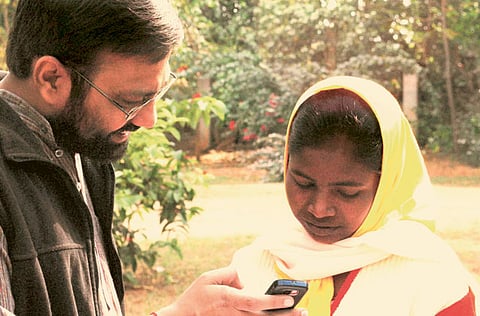Hinterland reporting
CGnet Swara aims to make tribals' woes heard through mobile news

In the Naxalite-plagued Chhattisgarh region of central India, a new initiative is empowering marginalised communities through mobile phones. CGnet Swara is a system with which anyone can record a news item through mobile phones, which appears as a link on the website. CGnet Swara is the brainchild of communications professional Shubhranshu Choudhary, who earlier founded www.cgnet.in, a place to share everything about Chhattisgarh.
A former British Broadcasting Corporation staffer, Choudhary tied up with Bill Thies of the Massachusetts Institute of Technology (MIT), who now works with Microsoft Bangalore, and CGnet Swara was born in February 2010. This initiative was funded by Microsoft, MIT and the US-based Knight Foundation.
"This is India's first war in the information age. We, a collective group of citizen journalists who came together on a platform called Cgnet, thought of using the new technology to solve this problem of journalism. After many experiments, which succeeded to different degrees, we ended up creating the world's first radio on mobile phones," Choudhary said.
Earlier they launched the "community radio scheme", which could not take off in the remote tribal villages due to the problem of poverty and irregular power supply. Then they made the mobile phone their new weapon for information.
CGnet Swara is a community radio on mobile phones. One can leave a missed call on 080 4113 7280 and the number calls back, and then the person can listen to messages left by others. People can also record their own messages in the same fashion.
Once a news item is uploaded, it appears as a link on the website. Then the moderator opens up the link and edits the content. The content of each report is checked and edited before the report is published.
Choudhary said: "The people [tribals] of this region have very little connection with the outside world. With mobile penetration, it was the only way to provide news to these tribal people."
People have the option to listen to the news in any of the four languages— Gondi, Chhattisgarhi, Kurruk and Hindi — by just calling up. This tool can also help save the tribal languages, as these will be first community news outlet in these languages.
Choudhary claimed the scheme, launched last year, has been well received.
"We are getting a lot of information from remote areas in tribal dialects. CGnet Swara would not remain confined to tribal areas. There is a plan to convert CGnet Swara into a product that can be used by all, including key persons. It is also planned to raise funds through advertisements," Choudhary said. "It's going to bridge the digital divide among the tribals."
There is a feeling that the mainstream urban media in the country does not care about tribal people. But such an initiative would help provide a place for them to speak about their complaints and needs.
CGnet Swara receives more than 60 calls a day. People use it to feed their own news and also for listening to uploaded news. Recorded messages are also sent to more than 18,000 people by e-mail. These people are then asked to approach designated officials to take action.
CGnet Swara gets all kinds of reports, ranging from atrocities committed by the police against tribals to non-payment of salaries to teachers at local schools.
"CG in CGnet Swara stands for Central Gondwana, and we are hoping that with help from friends, we will be able to develop it as a platform for the entire region where tribals are divided by various artificial administrative boundaries," Choudhary said. "We have been under constant attack from the police since we started. That probably shows that it can be a useful and effective tool to improve communication between tribals and also their communication with the outside world."
Bhan Sahu, who lives in Ambagarh Chowki near Rajnandagaon, is the most active female reporter of CGnet Swara. She reported about the use of children in Tendu leaf collection. She said: "Tendu leaf collection has started in the tribal areas of Chhattisgarh. But contractors are using children for drying of the leaves and paying them Rs15 [about Dh1.25] per day. The official rate for Tendu collection is Rs70 per 1,000 leaves this year. Can some of you please get in touch with the authorities to stop it?"
"I can report anything and everything going on in my area. I can pressure the authorities to stop it. I have a place for myself to air my problems. Issues that are important for the poor are rarely covered. I want the voice of the poor to reach the authorities through my news," Sahu said.
Choudhary, who runs this system with the help of nine volunteers, is now working to give it a national reach. He is running this system with the help of nine volunteers. But some are also using this system for different reasons. Budhan, a folk singer, uses CGnet Swara to upload his songs on social issues.
CGnet Swara is a means for communities such as Gond and Oraon to communicate and express issues in their own language.
However, the rising use of CGnet Swara has not found favour with the government. The state government and administration appear to be critical of CGnet Swara and its popularity in the tribal heartland, where a war is going on with insurgents.
CGnet Swara's citizen journalists believe they are not with either the Maoists or the security forces. With CGnet Swara, these people have a voice of their own.
Shuriah Niazi is a freelance journalist based in central India.
Sign up for the Daily Briefing
Get the latest news and updates straight to your inbox



